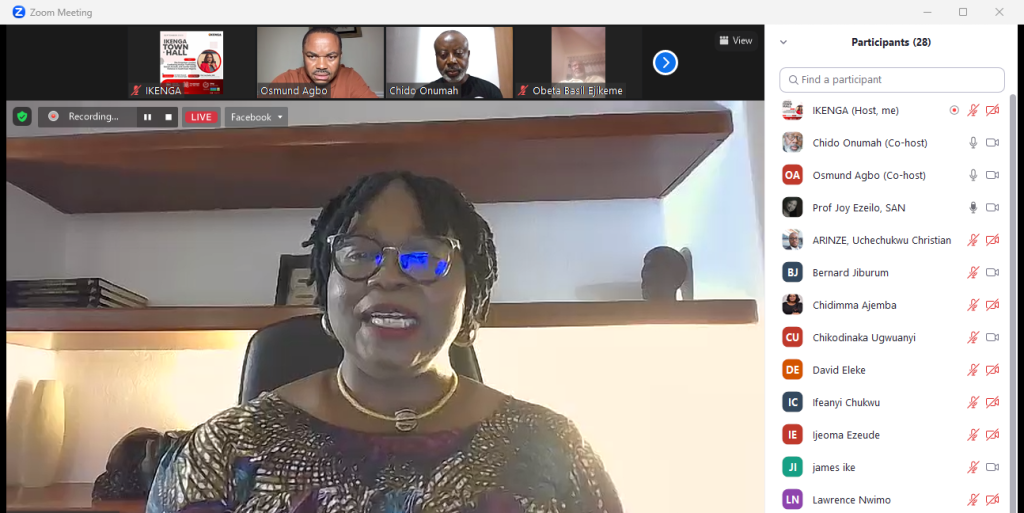Stephen Ukandu, Umuahia
Rights activist and former United Nations Special Rapporteur on trafficking in persons, Professor Joy Ezeilo, SAN, has raised the alarm that human traffickers now use enticing job opportunities abroad to lure their victims.
The Chairperson, Sexual Assault Referral Network (SARC); and Founder, Women Aid Collective (WACOL), raised the alarm while delivering a keynote address during the Ikengaonline town-hall meeting held Thursday night.
She warned those desperate to leave Nigeria and migrate to overseas at all cost to be wary of seemingly lucrative jobs abroad to avoid falling victim of human trafficking.
Professor Ezeilo who spoke on “The Forgotten Victims: Combating Human Trafficking, Sexual Assault, and Gender-Based Violence in South-East Nigeria,” also decried the increasing rate of organ trafficking.
According to her victims of human trafficking sometimes end losing their organs or in forced labour abroad.
She also decried the involvement of unscrupulous medical personnel in organ trafficking, and warned youths to be careful.
The Professor of Law and Co-Chair Africa Advisory Committee, Human Rights Watch, Africa Division, advocated inclusion of vocational education in the curriculum to enable graduates to become self reliant upon graduation instead of searching for non-existent jobs that often make them vulnerable to trafficking.
She said that contrary to the wrong notion that human trafficking is only rampant in Edo, the menace is now common in South-East.
“We should stop thinking it’s Edo phenomenon, Igbos are also traffickers and traffic victims.”
Describing human trafficking as modern slavery, and migration gone wrong, Ezeilo said Nigerians were being trafficked to different parts of the world.
She noted that the rate of human trafficking is under reported while calling for tighter measures against the scourge.
Speaking further, Professor Ezeilo decried the prevalence of ‘baby factories’ in the country despite the fight against the scourge, noting that the perpetrators are highly connected.
“They have a lot of money and powerful people are behind them,” she regretted.
She regretted that sometimes officials of National Agency for Prohibition of Trafficking In Persons (NAPTIP), often lose their jobs fighting the monster.
The Distinguished Law Professor, and Emeritus Dean of Law at the University of Nigeria Nsukka, UNN, also decried the rate of sexual abuse against domestic helps.
She regretted that sometimes law enforcement agents demand mobilisation before responding to cases of sexual abuse, and also make it unnecessarily cumbersome to re-unite trafficked victims with their families.
Professor Ezeilo further noted with disgust the rising cases of incest and gang rape, regretting that sometimes the affected family because of stigma prefer the closing of such cases.
She commended the efforts of South-East First Ladies in combating human trafficking and sexual abuse, and called for more collaboration with the relevant agencies against the menace.
Participants also emphasised the need for law enforcement agents and Rights organisations to be smarter and more strategic in the fight against the scourge as the perpetrators are always thinking ahead.
The two-hour explosive show was co-hosted by US-based medical doctor and prolific writer, Dr Osmond Agbo; and veteran Journalist, Dr Chido Onumah.
Participants from different parts of the world including representatives of the Minister for Women Affairs, Commissioner for Women Affairs Abia State, NAPTIP boss, National Orientation Agency (NOA) among others dignitaries, also made their inputs.
Prominent Igbo sons and daughters including Mrs Oby Ezekwesili, Mobalisa Chinda, Chichi Aniagolu- Okoye, Kalu Idika Kalu, Chief Emmanuel Iwuanyanwu, Senator Enyinnaya Abaribe, Professor Pat Utomi, Chief Nnia Nwodo, Professor Kingsley Moghalu, Professor Greg Ibe, among others, have variously featured on IkengaOnline town-hall meeting since its inception in 2022.
Ikengaonline, a South-East-focused online media outfit, is a publication of Ikenga Media and Cultural Awareness Initiative (IMCAI), a non-profit entity that seeks to promote positive socio-cultural values, accountability and good governance through media and public education.
It is part of the Collaborative Media Engagement for Development Inclusivity and Accountability Project, a multi-level intervention for media independence and government accountability, managed by the Wole Soyinka Centre for Investigative Journalism (WSCIJ) and supported by the MacArthur Foundation.

